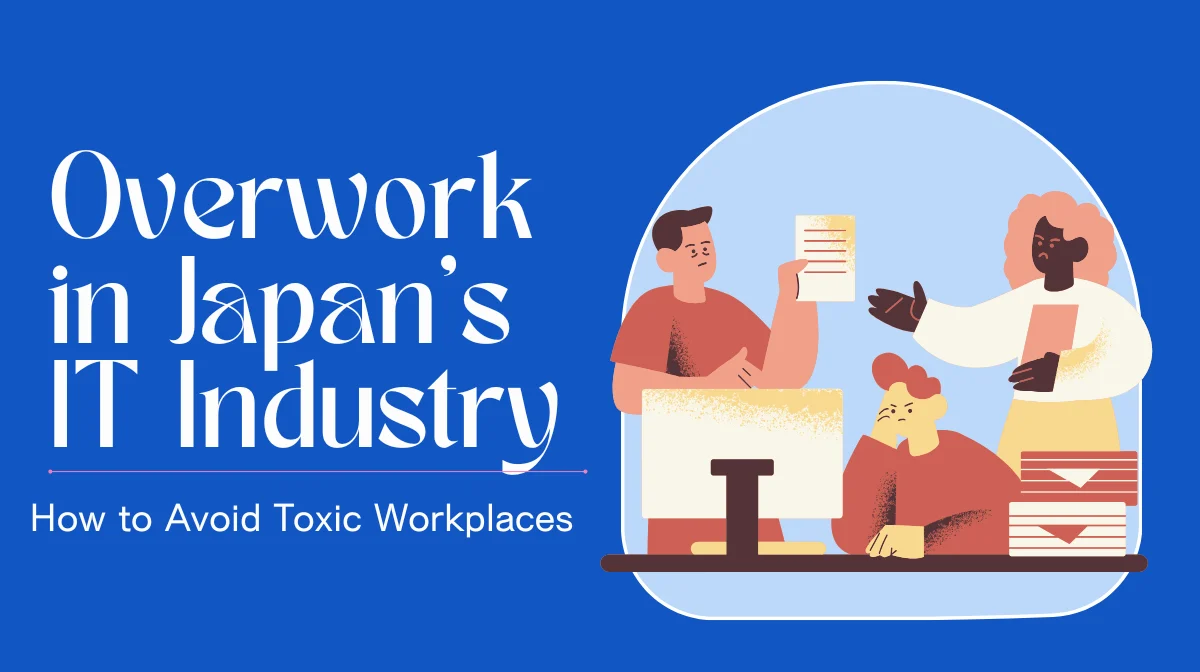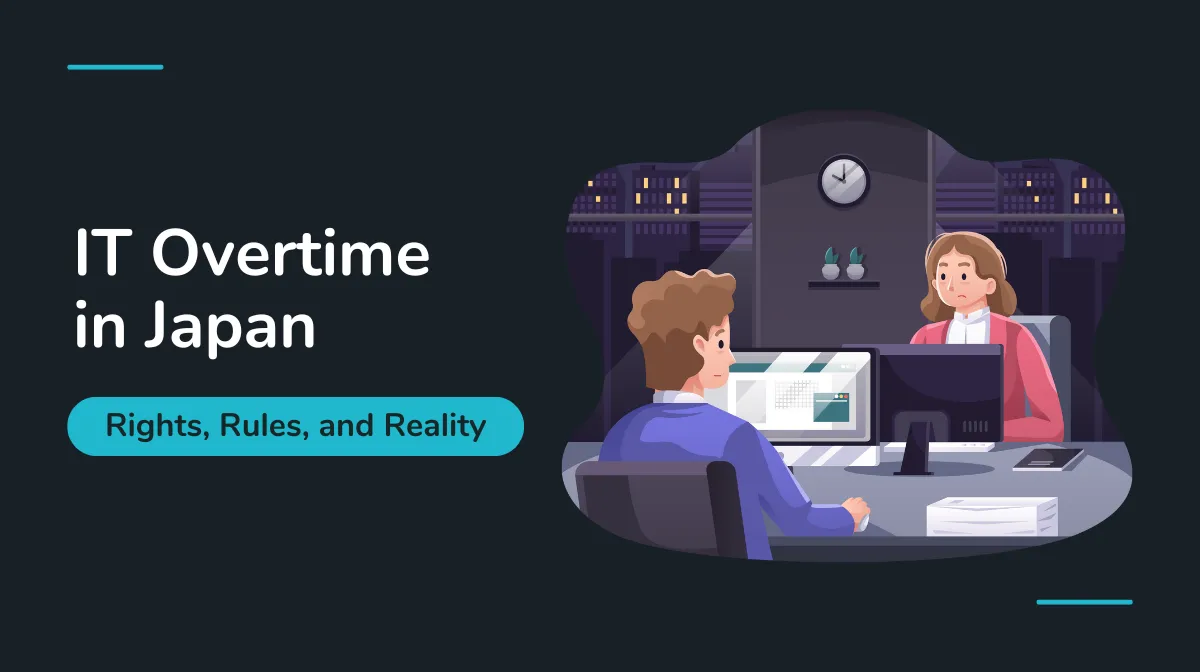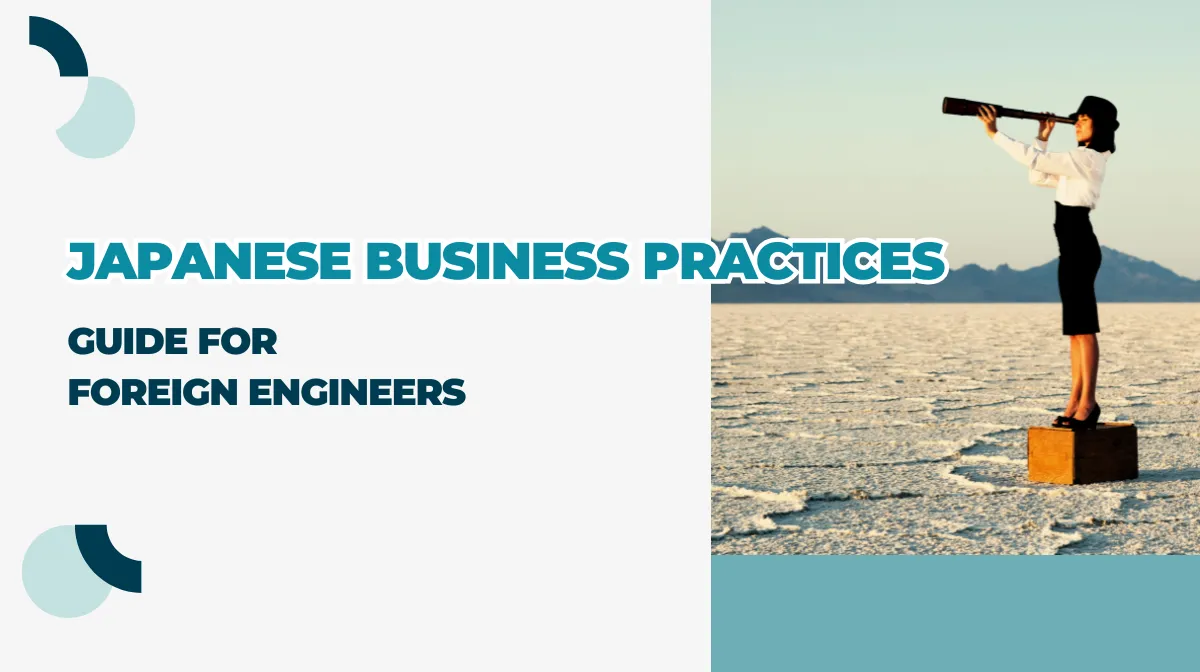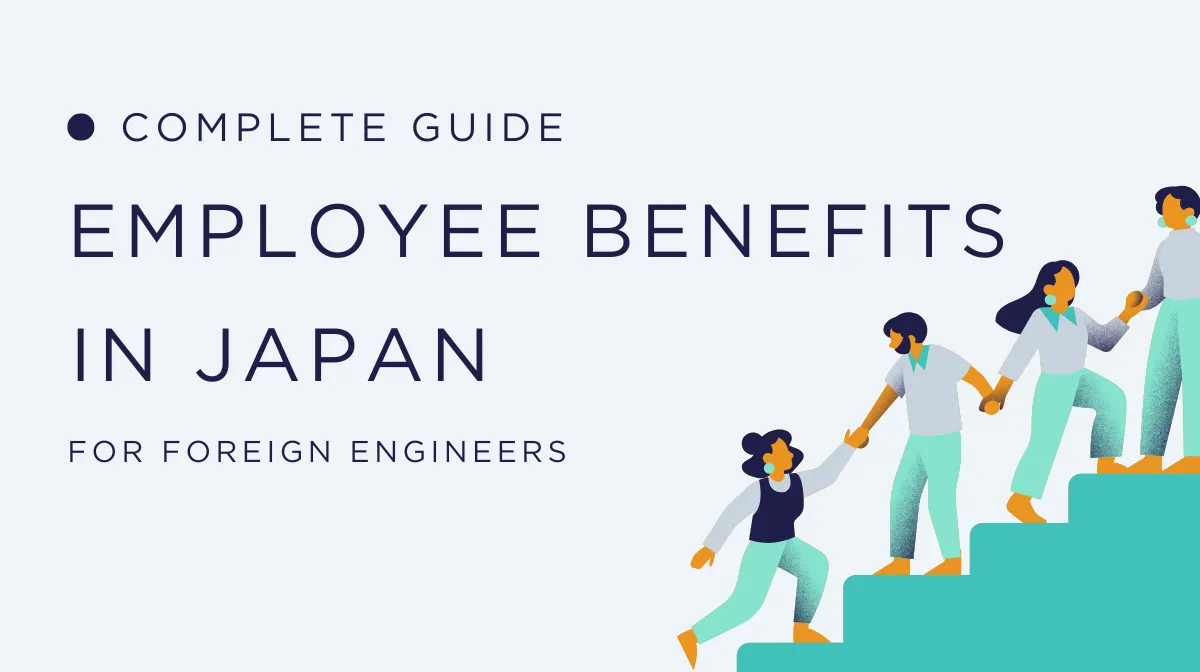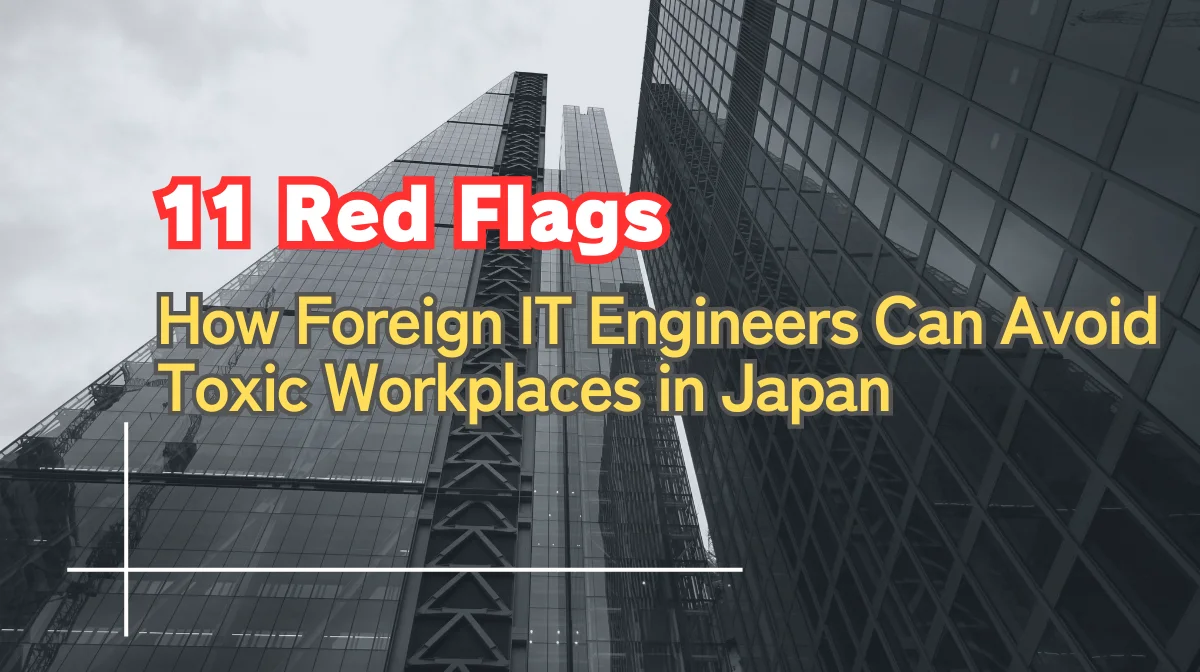Warning: Under 105 days.
Japan’s IT workers face 1.5x more overtime than other industries, with one in three engineers at risk of mental health issues. Foreign engineers face additional risks from language barriers and legal unfamiliarity. This guide helps you identify and avoid toxic workplaces.
- How overwork affects 34% of Japan’s IT engineers.
- Why Japan’s IT has 1.5x more overtime than others.
- How to spot toxic workplaces as a foreign engineer.
1. How Serious Is Overwork in Japan’s IT Industry?

Japan’s IT industry has serious problems with long working hours and employee burnout. For foreign engineers, understanding Japan’s work culture is essential for staying safe and healthy.
IT Workers Average 15.8 Hours of Overtime Monthly
The Ministry of Health, Labour and Welfare’s 2024 survey shows IT industry workers average 15.8 overtime hours per month. The national average across all industries is just 10 hours monthly.
This means IT workers do 50% more overtime than workers in other fields. Despite recent work-life balance reforms, overwork remains a major problem.
参考: 厚生労働省:毎月勤労統計調査 月間実労働時間及び出勤日数
34% of Engineers Show Signs of Mental Health Problems
Excessive work can lead to depression, anxiety, and in extreme cases, karoshi (death from overwork).
The government’s 2024 White Paper on Overwork Prevention found that 34% of DX specialists show mental health warning signs. This breaks down to 17.8% with possible depression or anxiety and 16.2% with severe symptoms.
Physical Health Risks Are Real
In 2023, 23 IT workers filed for work-related injury compensation due to brain or heart problems. This number rose to 29 in 2024. While not the highest among all industries, these numbers prove that deadly overwork exists in Japan’s tech sector.
■Related Reading
Understanding Japanese workplace culture helps foreign engineers recognize overwork patterns and navigate professional expectations effectively.
2. Why Overwork in Japan’s IT Industry Became Normal
Understanding why Japan’s IT industry has such serious overwork problems helps foreign engineers choose safer companies. The industry has three main structural issues.
Complex Subcontracting Creates Time Pressure
Japan’s IT industry uses a multi-layer subcontracting system. Work flows from prime contractors to second-tier companies, then to third-tier subcontractors. This pyramid structure squeezes time and budgets at each level.
A six-month project might leave only 3-4 months for the final subcontractor. Each company takes a cut of the budget, leaving bottom-tier firms with less money and time. They must do more work with fewer people, forcing employees into overtime and weekend work.
Companies Provide Free Changes and Bug Fixes
Japanese business culture emphasizes extreme customer service. Many IT companies accept unlimited changes and fixes without charging extra fees. Sales teams often promise changes without understanding the technical complexity while keeping original deadlines. Engineers must work longer hours to deliver these “free” services.
Old Management Still Values Long Hours
Traditional Japanese management believes longer hours equal harder work. Some bosses judge employees by how late they stay, not by results. This outdated thinking encourages inefficient practices where companies throw more hours at problems instead of improving processes.
■Related Reading
Learn your legal rights regarding overtime limits and working hours to protect yourself from exploitative practices in Japan’s IT sector.
■日本でエンジニアとしてキャリアアップしたい方へ
海外エンジニア転職支援サービス『 Bloomtech Career 』にご相談ください。「英語OK」「ビザサポートあり」「高年収企業」など、外国人エンジニア向けの求人を多数掲載。専任のキャリアアドバイザーが、あなたのスキル・希望に合った最適な日本企業をご紹介します。
▼簡単・無料!30秒で登録完了!まずはお気軽にご連絡ください!
Bloomtech Careerに無料相談してみる
3. Additional Overwork Risks for Foreign Engineers in Japan’s IT Industry
Foreign engineers face the same overwork problems as Japanese workers, plus additional risks from language barriers and legal unfamiliarity.
Visa Problems from Illegal Overtime
Japanese law requires companies to file “36 Agreements” before asking employees to work overtime. Legal limits are 45 hours per month and 360 hours per year, with absolute maximums of 100 hours monthly and 80 hours average across multiple months.
Some companies exploit foreign workers’ lack of legal knowledge by forcing illegal overtime or skipping required paperwork. If immigration authorities discover violations, the company loses its right to hire foreign workers, preventing visa renewals. Students and others with work-hour restrictions face visa cancellation risks.
Language Barriers Block Access to Help
Work rules and legal rights are often explained only in Japanese. Many foreign employees don’t understand their rights or working conditions. When problems arise, they don’t know where to get help. Japanese workplace culture uses indirect communication that can confuse international employees, leading to workplace conflicts and isolation.
■Related Reading
Master essential Japanese business practices to avoid cultural misunderstandings that can lead to workplace conflicts and stress.
4. Avoiding Overwork in Japan’s IT Industry: Red Flags of Toxic Workplaces
Warning: Over 45 hours included.
Look for burnout complaints.
Signals no time for growth.
Research companies carefully before accepting job offers. Several warning signs indicate employers with toxic workplace cultures and serious overwork problems.
Major Warning Signs
Annual holidays under 105 days means no real weekends. Healthy companies offer 120+ annual holidays. Fixed overtime over 45 hours suggests massive overtime is normal. Look for companies with under 30 hours or no fixed overtime to avoid toxic workplaces.
Research Company Culture
Check employee review sites for patterns of complaints about excessive overtime, high turnover, unpaid work, and poor work-life balance. Look at the company’s technical activities like blog posts, GitHub contributions, and conference presentations. Overworked engineers often can’t maintain these professional development activities.
■日本でエンジニアとしてキャリアアップしたい方へ
海外エンジニア転職支援サービス『 Bloomtech Career 』にご相談ください。「英語OK」「ビザサポートあり」「高年収企業」など、外国人エンジニア向けの求人を多数掲載。専任のキャリアアドバイザーが、あなたのスキル・希望に合った最適な日本企業をご紹介します。
▼簡単・無料!30秒で登録完了!まずはお気軽にご連絡ください!
Bloomtech Careerに無料相談してみる
5. Legal Limits on Overwork in Japan’s IT Industry
Knowing your legal rights helps you recognize when companies violate overwork limits. Japanese labor law sets clear boundaries: 8 hours per day, 40 hours per week as standard.
Overtime requires special agreements with strict caps of 45 hours monthly and 360 hours yearly. Special circumstances allow up to 720 hours yearly but never more than 80 hours monthly average or 100 hours in any single month.
■Related Reading
Understand comprehensive employee benefits in Japan to ensure you’re receiving proper compensation and protections from your employer.
6. Getting Help for Overwork in Japan’s IT Industry
Don’t suffer alone if you experience excessive working hours. Japan has support systems specifically for foreign workers.
Labor Standards Inspection Offices investigate companies that violate working hour laws and can force compliance. The Foreign Worker Consultation Hotline offers multilingual advice for overtime issues and workplace harassment. The Labor Conditions Consultation Hotline operates evenings and weekends for urgent situations. All services are free and confidential.
■Related Reading
Discover comprehensive strategies for identifying and avoiding toxic workplace environments before they impact your career and health.
7. Protecting Yourself from Overwork in Japan’s IT Industry
Overwork in Japan’s IT industry is a serious issue affecting one in three engineers, with 50% more overtime than other sectors. Foreign workers face additional risks from language barriers and unfamiliarity with labor laws.
However, you can protect yourself by understanding the warning signs, knowing your legal rights, and researching companies thoroughly before accepting job offers. Use available support services when needed and remember that many Japanese tech companies are actively improving their work cultures.
With proper knowledge and preparation, you can build a successful and healthy career in Japan’s growing IT sector while avoiding the pitfalls of overwork.

